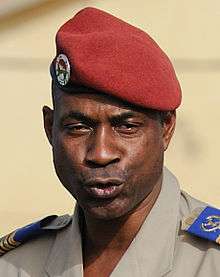Gilbert Diendéré
| Gilbert Diendéré | |
|---|---|
 | |
| Chairman of the National Council for Democracy of Burkina Faso | |
|
In office 17 September 2015 – 23 September 2015 | |
| Preceded by | Michel Kafando (Transitional President) |
| Succeeded by | Michel Kafando (Transitional President) |
| Personal details | |
| Born |
c. 1960 (age 55–56) Upper Volta (now Burkina Faso) |
| Political party | Independent |
| Military service | |
| Allegiance |
|
| Rank | General |
| Unit | Regiment of Presidential Security |
Gilbert Diendéré (French pronunciation: [ʒil.bɛʁ djɛn.de.ʁe]; born c. 1960)[1] is a Burkinabé military officer and the Chairman of the National Council for Democracy, the military junta that briefly seized power in Burkina Faso in the September 2015 coup d'état. He was a long-time aide to President Blaise Compaoré, serving as commander of the Regiment of Presidential Security (RSP) during Compaoré's rule.[2] He was appointed as chairman of the junta on 17 September 2015.[3]
Career
Diendéré is suspected of having been directly involved in the October 1987 coup that resulted in the death of Thomas Sankara and installed Blaise Compaoré in power.[1] Diendéré was commander of the national commando training center in Pô at the time of the coup, and all known assailants were identified by the sole survivor of the assault, Alouna Traoré, as having served directly under Diendéré.[4]
During Compaoré's 27 years in power, Diendéré was considered one of his key allies in the military, serving as chief of staff and head of the elite Regiment of Presidential Security, although he was also viewed as a shadowy figure. In late 2014, following the ouster of President Compaoré, Diendéré was dismissed from his military leadership posts by the transitional authorities. Although he no longer headed the RSP, he remained closely linked to it during the events of 2015, in which the RSP found itself at odds with the transitional authorities, which wanted to disband it.[5]
Members of the RSP launched a coup on 16 September 2015, detaining President Michel Kafando and Prime Minister Isaac Zida. On 17 September, Diendéré was appointed as Chairman of the National Council for Democracy, the new military junta.[3] However, the junta failed to consolidate its authority across the country and faced pressure from regional leaders, and eventually from the regular army.[6]
On 22 September the RSP agreed to a deal with the regular military requiring that all RSP troops return to their base. On 23 September interim President Kafando was restored to office. Diendéré admitted that the coup was a "waste of time and resources... and human lives were lost". A meeting between Diendéré and several West African leaders occurred after a ceremony celebrating Kafando's return.[6][7]
The government dissolved the RSP on 25 September 2015, and on 26 September it froze the assets of Diendéré and others associated with the coup.[8] After the army assaulted and captured the RSP's base, Diendéré fled to the Vatican embassy. The government assured the Vatican that Diendéré would not be killed, and he was turned over and taken into custody by the government on 1 October, escorted by former President Jean-Baptiste Ouédraogo.[9]
In addition to facing prosecution for the coup, Diendéré was also charged with involvement in Sankara's death.[10]
References
- 1 2 Mbog, Raoul; Lepidi, Pierre (2015-09-17). "Qui est Gilbert Diendéré, nouvel homme fort du Burkina Faso?" [Who is Gilbert Diendéré, new strong man of Burkina Faso?]. Le Monde (in French). Paris. Retrieved 15 October 2015..
- ↑ Winsor, Morgan (2015-09-17). "Who Is Gilbert Diendere? Burkina Faso Military General Leads Coup, Overthrows Transitional Government With Allies Of Former Ruler Blaise Compaore". International Business Times. New York, NY (USA). Retrieved 15 October 2015.
- 1 2 Coulibaly, Nadoun; Bonkoungou, Mathieu (2015-09-17). "Soldiers crush protests as military seizes power in Burkina Faso - Reuters". news.yahoo.com. Retrieved 15 October 2015.
- ↑ Harsch, Ernest (2014). Thomas Sankara: An African Revolutionary. Ohio short histories of Africa. Athens, Ohio (USA): Ohio University Press. p. 145. ISBN 978-0-8214-2126-0. OCLC 893333083.
Campaoré denied that he had issued orders for Sankara's assassination, and claimed to have been at home in bed ill at the time of the killing. Many found it hard to believe that his men would have acted on their own. And they were Compaoré's men. The killers included Sergeant Hyacinthe Kafando, Compaoré's aide de camp. He and the other known assailants all served directly under Captain Gilbert Diendéré, then the commander of the Pô commando base and soon to become head of Compaoré's military security force.
- ↑ "Burkina's ex-military honcho Diendere emerges from the shadows", Agence France-Presse, 17 September 2015.
- 1 2 Patrick Fort and Romaric Ollo Hien, "Burkina president resumes power after week-long coup", Agence France-Presse, 23 September 2015.
- ↑ "Burkina Faso coup: Michel Kafando reinstated as president", BBC News, 23 September 2015. Retrieved 25 September 2015
- ↑ Bonkoungou, Mathieu (2015-09-26). Maler, Sandra, ed. "Burkina Faso prosecutor freezes assets of leader of failed coup | Reuters". reuters.com. Matthew Mpoke Bigg. Reuters. Retrieved 15 October 2015.
- ↑ Coulibaly, Nadoun; Bonkoungou, Mathieu (2015-10-01). "Burkina Faso coup leader handed over to government: sources - Reuters". news.yahoo.com. Souleymane Ag Anara, writing by Daniel Flynn and Joe Bavier; editing by Makini Brice and Ken Wills. Retrieved 15 October 2015.
- ↑ Nadoun Coulibaly, "Exclusive: Burkina charges former coup leader over murder of Sankara", Reuters, 6 December 2015.
| Political offices | ||
|---|---|---|
| Preceded by Michel Kafando as Transitional President of Burkina Faso |
Chairman of the National Council for Democracy of Burkina Faso 2015 |
Succeeded by Michel Kafando as Transitional President of Burkina Faso |